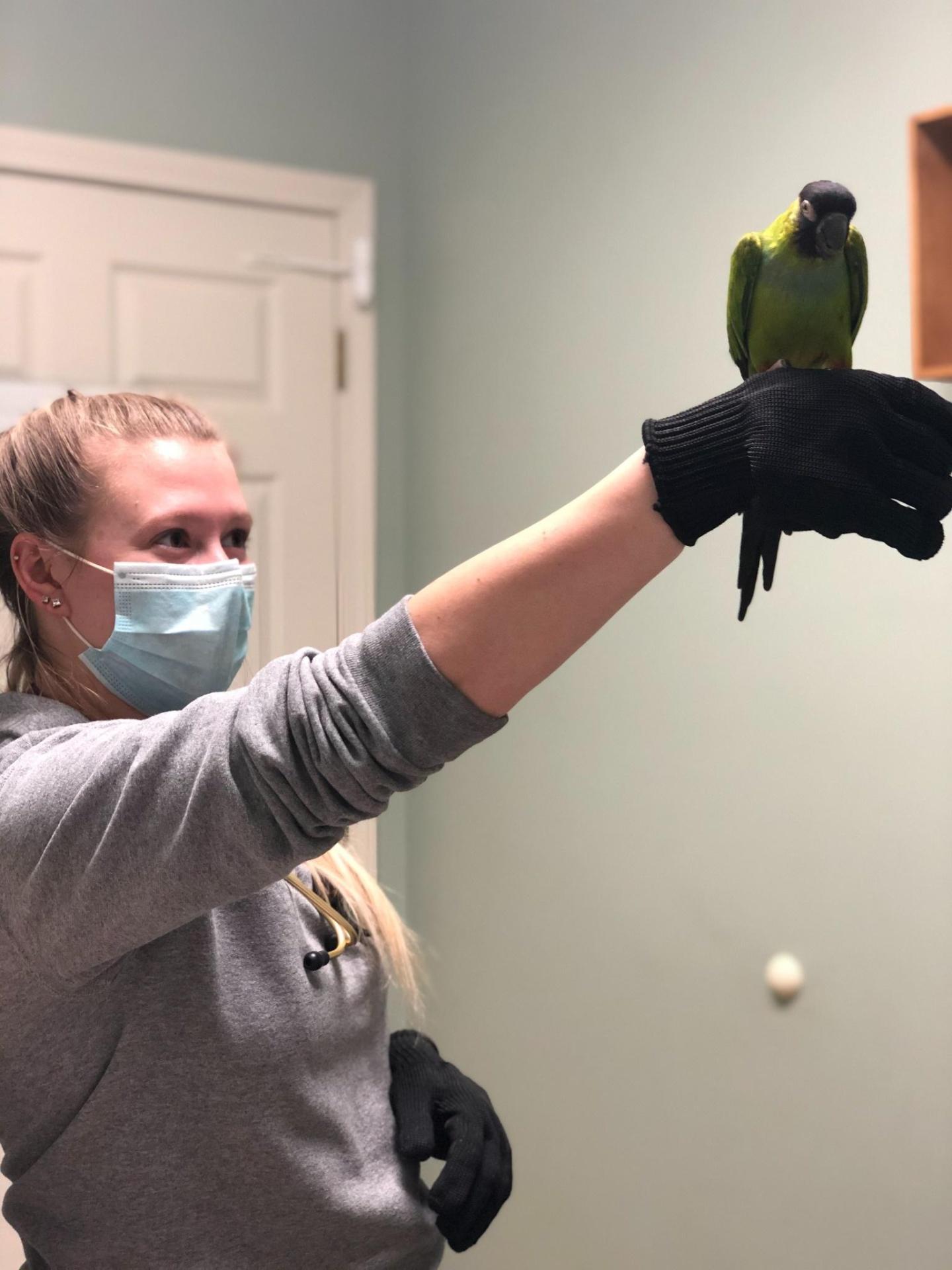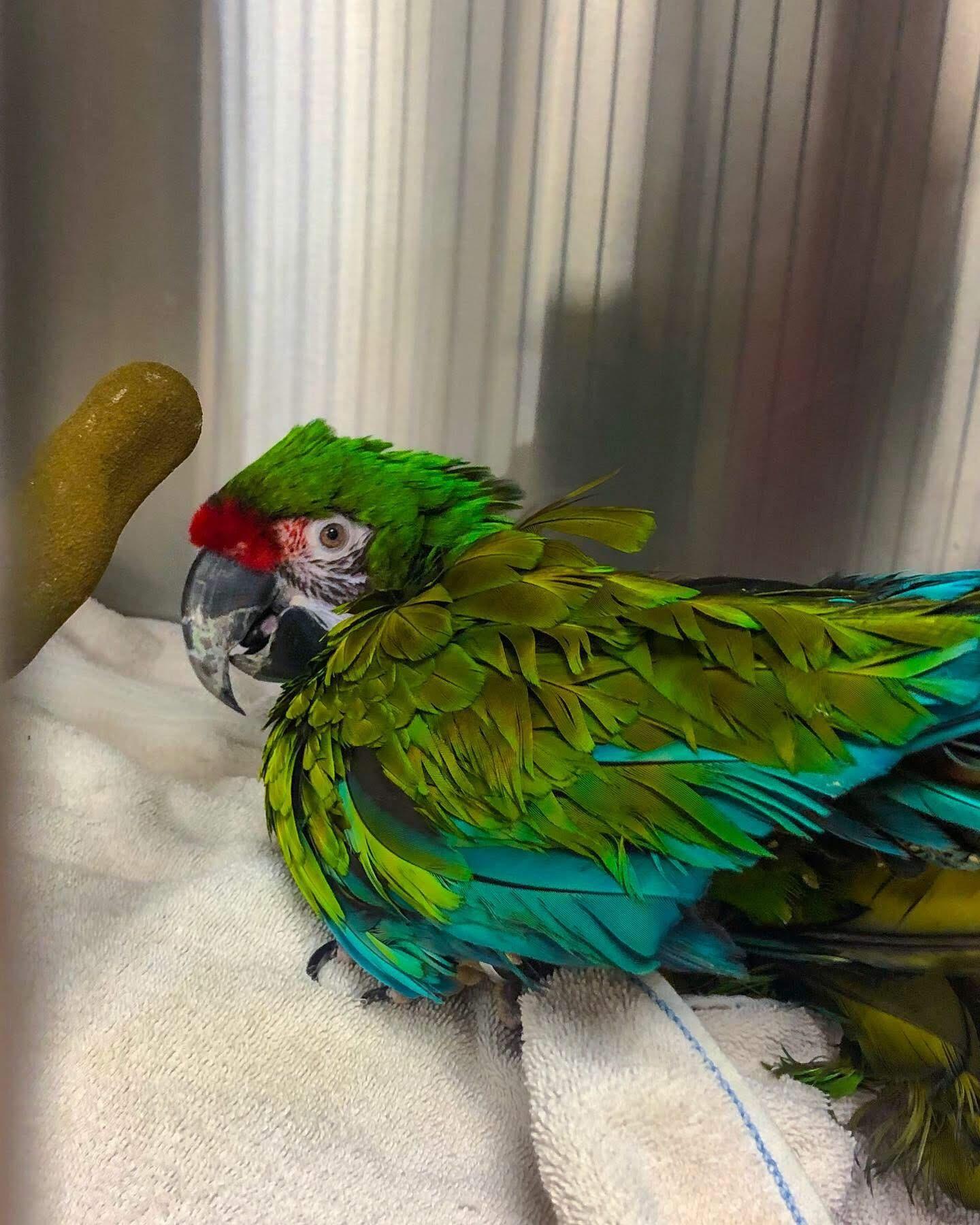Parrot Care at Advanced Animal Care ER
Comprehensive Care for Your Feathered Companion
At Advanced Animal Care ER, we understand that parrots are intelligent, social, and long-lived pets that require specialized care to thrive. Whether you're a first-time parrot owner or an experienced bird enthusiast, our team is here to provide expert care to ensure your parrot enjoys a long, healthy, and happy life. From routine wellness exams to emergency treatments, we’re committed to the well-being of your feathered friend. 
What to Expect During Your Parrot's Visit:
When you bring your parrot to Advanced Animal Care ER, you can expect compassionate, expert care from our team. Here’s what to expect during an initial visit:
-
Comprehensive Physical Exam: Our veterinarian will conduct a thorough exam to check your parrot’s overall health, including its feathers, beak, eyes, and overall body condition.
-
Diet and Environment Review: We’ll discuss your parrot’s diet, living environment, and any behavioral changes to ensure they are getting everything they need.
-
Diagnostic Testing: If needed, we may recommend bloodwork, fecal exams, or x-rays to diagnose any underlying health conditions.
-
Personalized Care Plan: Based on the exam and test results, we’ll provide a tailored care plan for your parrot, which may include dietary adjustments, habitat changes, or treatment for health concerns.
Common Parrot Health Concerns We Treat: 
Parrots are generally healthy, but they are susceptible to certain health problems. Some of the most common issues we address include:
-
Feather Plucking: A behavioral issue often caused by boredom, stress, or health problems.
-
Respiratory Infections: Parrots can be sensitive to respiratory infections, often caused by poor ventilation, drafts, or infection.
-
Beak and Nail Issues: Overgrown or cracked beaks and nails can cause discomfort and difficulty eating or perching.
-
Obesity: Parrots that are overfed or not provided enough exercise can become obese, leading to health complications.
-
Parasitic Infections: Parrots are susceptible to internal and external parasites, such as mites, worms, and fungal infections.
Prompt veterinary care is essential to prevent and treat these conditions.
Parrot Care FAQs:
What's the most important thing I need to know about caring for a pet parrot?
The most important thing to know is that parrots are highly social, intelligent animals that need regular interaction, mental stimulation, and a varied diet. A proper environment, attention to their social needs, and regular veterinary check-ups are essential to their well-being.
How long will my pet parrot live?
Parrots can live for many years, depending on the species. Small parrots like budgies may live 5–10 years, while larger parrots like macaws can live 50 years or more.
What are the best parrot cages?
The best cages for parrots are spacious, made from bird-safe materials, and provide room for them to move around, climb, and spread their wings. The bars should be spaced no wider than 1/2 inch to prevent escape or injury. A vertical cage with perches at different heights is ideal.
What are the best parrot perches/branches?
Parrots need perches made of natural wood (e.g., apple, willow, or manzanita) to help prevent foot problems. Perches of different sizes and textures help keep their feet healthy.
What are safe toys for my parrot to play with?
Safe toys for parrots include wooden chew toys, foraging toys, bells, and ropes. Avoid toys with sharp edges or those made from toxic materials like lead or certain plastics.
What is the best food for a parrot?
Parrots require a balanced diet that includes:
-
High-quality pellets as the main portion of their diet.
-
Fresh fruits (like apples, berries, and oranges) and vegetables (like leafy greens, carrots, and bell peppers).
-
Nuts in moderation (e.g., almonds, walnuts).
-
Occasional seeds for variety.
Do I need to know how to pet a parrot? How can I learn more about parrot training?
Parrots can be petted, but many prefer being scratched on the head or neck rather than being touched on their bodies. Training involves positive reinforcement and consistent interaction. Reading books or attending workshops on parrot behavior and training can help improve your bond and communication with your parrot.
What is the easiest parrot to train?
The African Grey Parrot, budgies, and cockatiels are some of the easiest parrots to train due to their intelligence and desire to interact with humans.
How can I teach my parrot to talk?
Parrots learn to talk by repeating words or phrases they hear frequently. Be patient and use consistent vocal cues while reinforcing with treats.
Why do parrots repeat sounds or mimic?
Parrots are mimicry specialists and repeat sounds or words as a way to communicate. They mimic sounds to bond with their human family or to get attention.
Why is my parrot squawking?
Parrots may squawk for several reasons, including attention-seeking, boredom, or a need for stimulation. Squawking can also indicate stress, hunger, or discomfort.
Why do parrots dance?
Parrots bob their heads or dance to express joy, mimic rhythms, or respond to sounds or music. It’s a sign of happiness or excitement.
Do parrots like music?
Yes, many parrots enjoy music, and they may even dance or sing along to tunes they like. However, it's important not to expose them to loud or discordant sounds.
Why do parrots bob their heads up and down?
Head-bobbing is a common behavior in parrots, often seen as a sign of excitement, attention, or even a form of courtship.
Why does my parrot shake its head?
Head-shaking could be a sign of discomfort or irritation, but it can also be a normal behavior, especially when they’re trying to clean their feathers.
Can you potty train a parrot?
Yes, with patience and consistency, parrots can be potty trained. Place them on a designated spot (such as a perch or towel) and reward them when they go to the bathroom in the correct spot.
Why does my parrot show aggressive behavior?
Aggressive behavior can be caused by fear, territoriality, or lack of socialization. It’s important to address the cause and provide consistent training.
Why does my parrot bite?
Biting can happen when a parrot feels threatened, is overstimulated, or simply doesn’t want to be touched. Be patient, avoid sudden movements, and allow your parrot time to adjust.
Why do parrots pluck their feathers?
Feather-plucking can be caused by boredom, stress, illness, or poor nutrition. If your parrot is plucking its feathers, consult with a veterinarian to determine the cause.
Why do parrots stand on one leg?
Standing on one leg is a natural behavior for parrots, often a sign of comfort or relaxation.
Why is my parrot puffed up?
A puffed-up parrot may be cold, ill, or simply trying to fluff their feathers to regulate body temperature.
Why do parrots regurgitate food?
Parrots regurgitate food as a sign of affection or bonding. They may offer regurgitated food to their favorite person or another bird.
Why does my parrot throw its food?
Throwing food is often a behavioral issue or a sign of disinterest in the food provided. It’s important to monitor their diet and ensure they’re receiving appropriate food.
Why do parrots shiver?
Shivering can be a sign of cold, illness, or stress. Make sure your parrot is kept in a warm, comfortable environment.
What do I do if and when my parrot lays an egg?
If your parrot lays an egg, make sure it has a comfortable and safe place to sit. If the egg is not fertilized, your parrot may ignore it. Avoid touching the egg unless absolutely necessary.
Do parrots need their beaks trimmed?
Parrots typically do not need beak trimming, but their beak may become overgrown if they don’t have enough natural items to chew on. If the beak is overgrown or malformed, a vet may need to trim it.
What do parrots eat?
Parrots eat a variety of foods, including pellets, fruits, vegetables, and nuts. A balanced diet with plenty of variety is essential to their health.
What is considered to be the best parrot food?
The best food for parrots is high-quality pellets, supplemented with fresh fruits, vegetables, and nuts.
Should I buy parrot food pellets?
Yes, pellets are recommended because they provide a complete, balanced diet. They contain all the necessary vitamins and nutrients that your parrot needs.
What fruits and vegetables can parrots eat?
Parrots can enjoy a variety of fruits and vegetables, including apples, carrots, spinach, sweet potatoes, and berries. Be cautious with foods that are high in sugar or fat.
Are mice safe to be around other pets?
Parrots can be kept safely around other pets as long as supervision is provided, but be cautious with cats, dogs, or small prey animals that might view the bird as prey.
Do I need to cover my parrot at night?
Covering your parrot at night with a breathable cloth can help them sleep by providing a dark and calm environment. Not all parrots need to be covered, so observe your bird’s behavior to see what works best.
Signs Your Parrot Needs Immediate Care:
If your parrot shows any of the following symptoms, it may need urgent care:
-
Labored breathing
-
Lethargy or unresponsiveness
-
Feather plucking or abnormal behavior
-
Diarrhea or changes in droppings
-
Blood in stool or urine
If you notice any of these signs, contact us immediately for urgent care.
How to Schedule an Appointment:
To schedule an appointment for your parrot, call Advanced Animal Care Emergency at 859-625-5678. Our team is here to provide the best care for your parrot.
